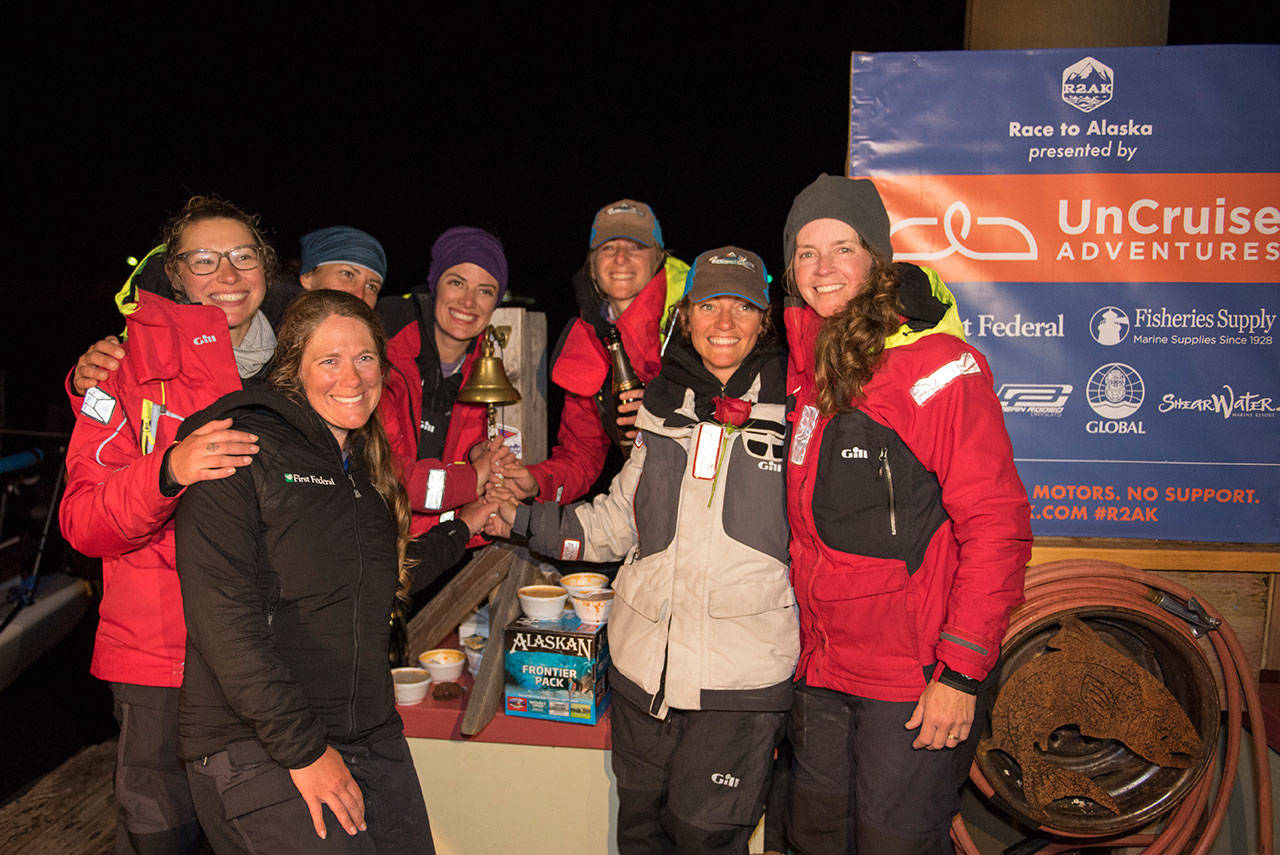KETCHIKAN, Alaska — Team Sail Like A Girl, an eight-woman Bainbridge Island crew, won the Race to Alaska at 12:17 a.m. Sunday after a floating log that “felt like a car crash” nearly derailed a 750-mile weeklong odyssey, Capt. Jeanne Assael Gousseve said.
“That moment of crisis, I think, really brought us together as a strong team,” Gousseve of Bainbridge Island said Sunday morning from Ketchikan after sleeping a spell.
“In any epic journey, people always have that moment when you are tested, and that was our moment.”
Sponsored by First Federal, Sail Like A Girl’s Melges 32, a 9½-foot-wide, wide-monohull racing sailboat, completed the fourth annual event from Port Townsend to Victoria to Ketchikan in 6 days, 13 hours, 17 minutes.
The first all-women crew to win the race arrived under bicycle power — two bike stations dangled off the stern that powered propellers — for a competition with the cornerstone motto, “no motor, no support, all the way to Alaska.”
Forty-three teams vied for a $10,000 first-place prize — and a second-place prize of eight steak knives in a monogrammed box.
The event was organized by the Northwest Maritime Center in Port Townsend.
“The top three or four teams were on top of each other for nearly 300 miles or so,” Maritime Center Executive Director Jake Beattie said Sunday in a telephone interview from Ketchikan.
The crew’s trek, aboard a day-sailing racing sailboat designed to fit six to eight people, was accomplished ahead of the four-man crew of second-place finisher Team Lagopus of North Vancouver, B.C., which finished in 6 days, 15 hours and four minutes.
Lagopus’ sail was in sight of Gousseve and her teammates until darkness fell a few hours before Sail Like A Girl pulled into Thomas Basin.
Gousseve’s crew, whose average age she said is about 41, also consists of Aimee Fulwell, Allison Dvaladze, Kelly Adamson Danielson and Haley King Lhamon, all of Bainbridge Island; and Anna Stevens, Kate Hearsey McKay and Morgana Buell, all of Seattle.
They collided with a log that Gousseve said was 15-20 feet long and 18 inches wide at about 2 a.m. Thursday north of Bella Bella, B.C.
“We went from 6 knots to zero in a second,” Gousseve said.
The boat was not damaged and the crew went back up to full sail, but lacked a cellphone signal or any idea of their race status.
“That was probably the lowest day for us, just being bummed that this log had been our barrier, had been our speed bump.
“We were all really supportive of each other, saying, it’s OK, this was never even about winning, so just keep going, let’s keeping doing this, let’s see if we can make up any ground.”
Around midnight Friday, they retrieved a cellphone signal, accessed the Race to Alaska tracker and discovered they were leading the pack.
“We didn’t think in a million years that would be the case,” Gousseve said.
“It drove us to really push hard.”
During the trip the Sail Like a Girl crew — the largest among the entrants — would sleep up to two at a time in the 32-foot boat’s coffin-like cabin in the stern.
“When you’re sailing in rough water, it’s good to be in a tight space, nice and tucked in,” Gousseve said.
The first part of the week was hot, dry and in the 80s, and the second half was foggy and wet with no cover except the cabin.
The crew ate dehydrated Good To-Go meals, heating two cups of water at a time with a tiny Jetboil stove.
They grabbed snacks from a huge bag, she said.
They went to the bathroom in a bucket with a clipped-on toilet seat.
“We were roughing it for sure,” Gousseve said.
Soaked, tired, exposed, hungry, living on an unsteady surface for more than 157 hours — how could eight people coexist peacefully in such a small space?
“It was all driven by humor,” Gousseve said.
They also looked out for each other, with “thank you” and “please” commonly heard.
“I’m really proud of how well we took care of each other and our health and just supporting what each of us needed,” she said.
They also made sure to talk out any tension that arose, predicating those conversations with code words: pickle for being upset, pineapple for potential danger.
“Instead of stressful words, it was a way of saying, ‘I need something,’ ” Gousseve said.
The team is donating funds they raise over expenses to the Sept. 8 Pink Boat Regatta in support of the Breast Cancer Research Foundation.
Team Sail Like A Girl, three of whom were new sailors three months ago, will be competing in that event, too.
The crew carried the names of people they know who have been affected by breast cancer.
“It helped us to dig deep to think about them,” Gousseve said.
“It was a wonderful way we could make this about something bigger than our own selves that was important to all of us.”
Beattie was standing at Thomas Basin when Sail Like A Girl cruised in shortly after midnight Sunday, in wintery weather strangely rainless for Ketchikan.
“They were celebrating each other,” Beattie said.
“It was humbling, I would say.”
________
Senior Staff Writer Paul Gottlieb can be reached at 360-452-2345, ext. 55650, or at pgottlieb@peninsuladailynews.com.

